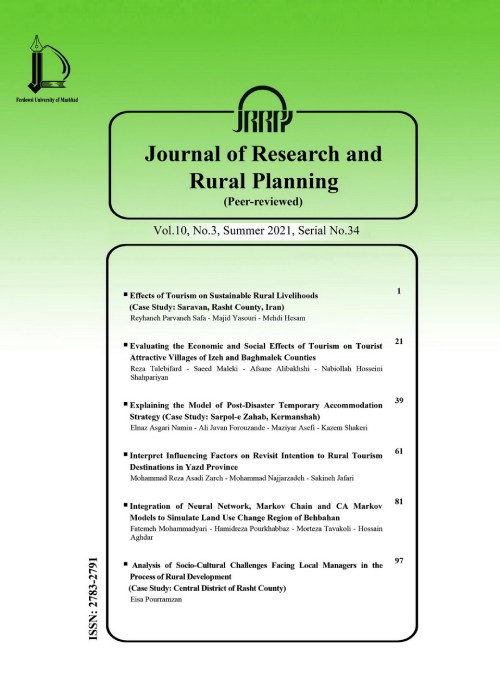Reviewing the Judicalization of Disputes among Villagers and Factors Affecting It (Case Study: Roshtkhar Dehestan)
Author(s):
Abstract:
Introduction
Humans are social beings; therefore, they have always been forced to live beside their fellow men. Although social life and relations have led to growth and progress, they sometimes create disturbance leading to the creation of conflicts over their interests and rights, which has resulted in fights and disagreements between them. To solve these disputes, in every era, many methods and solutions have been proposed based on the conditions and requirements of communities. Meanwhile, there have been many changes in different dimensions of villagers life, which are noticeable in most villages in Iran including villages of Roshtkhar District. Undoubtedly, these changes stem from the effective socio-cultural, economic, physical changes in rural communities which can affect the trend of change, its expansion and development.THEORETICAL FRAMEWORK: Developments in rural communities in Iran reflect a range of contrasts between past and present, or in other words, tradition and modernity, and the study on these developments is based on land reforms. In fact, rural areas had faced with economic, social, and environmental challenges but these challenges gradually disappeared and soon there were no choices except accepting modernity and being compatible with this new identity. Regarding the relationship between tradition and modernity, some social scientists believe that many traditional elements in cultural structure of societies are broken through the process of modernism deployment and transition from a traditional society to a modern one. In addition, new elements and structures should be replaced with old ones. Changing the traditional practices and introducing new ways for resolving conflicts among villagers are two important aspects of sociocultural changes in a society. In defining the concept of dispute, it should be said that dispute is a common social process with multidimensional features that has its own simplicity or complexity in all social systems. In other words, the word dispute refers to a situation in which human groups of a specific race, language, culture, religion, and economy have a conscious dispute because of a real or unreal incompatibility. Dispute is a worldwide phenomenon and is always happening inside societies. However, it is not necessarily without interruption or with the same intensity. Therefore, dispute is a social process with multidimensional features.
Methodology
In the present study, a descriptive-analytical methodology was used to investigate the parameters in two main phases. The first phase includes documentary and library studies, and using internet to investigate issues such as review of literature, background, concepts, and etc. In the second phase, some field studies were done to collect data, prepare and complete questionnaires. In the next step, 13 villages out of 26 villages of Roshtkhar District each with more than 100 households were selected as sample villages, and finally, having used Cochran Formula, 350 households were selected as sample households from the aforementioned villages. Then, questionnaires were completed by the head of sample households. Finally, having used Proportional Allocation Method, the number of households under study whose head has undergone the interview in each village was identified. In the next step, to analyze the data, One-Sample T-Test and Kruskal-Wallis test as well as Expert Choice, SPSS, and ARCG softwares were used.Discussion
The results of this study show that among interested indexes in reviewing the judicalization of disputes among villagers and the factors affecting it, social media with the average of 4.19, and the presence of government institutions with the average of 4.9 have the highest averages among the households under study. On the other hand, the factor that has the highest influence in judicalization of disputes among villagers is changing social aspects, which are influenced by facilities like social media, the presence of government institutions, access to cities, and other factors. These factors have made people not resort to traditional practices for resolving their disputes. In addition, One-Sample T-Test showed that there was a meaningful difference (ΡKeywords:
Language:
Persian
Published:
Journal of Research and Rural Planning, Volume:5 Issue: 1, 2016
Pages:
149 to 162
magiran.com/p1544605
دانلود و مطالعه متن این مقاله با یکی از روشهای زیر امکان پذیر است:
اشتراک شخصی
با عضویت و پرداخت آنلاین حق اشتراک یکساله به مبلغ 1,390,000ريال میتوانید 70 عنوان مطلب دانلود کنید!
اشتراک سازمانی
به کتابخانه دانشگاه یا محل کار خود پیشنهاد کنید تا اشتراک سازمانی این پایگاه را برای دسترسی نامحدود همه کاربران به متن مطالب تهیه نمایند!
توجه!
- حق عضویت دریافتی صرف حمایت از نشریات عضو و نگهداری، تکمیل و توسعه مگیران میشود.
- پرداخت حق اشتراک و دانلود مقالات اجازه بازنشر آن در سایر رسانههای چاپی و دیجیتال را به کاربر نمیدهد.
In order to view content subscription is required
Personal subscription
Subscribe magiran.com for 70 € euros via PayPal and download 70 articles during a year.
Organization subscription
Please contact us to subscribe your university or library for unlimited access!



